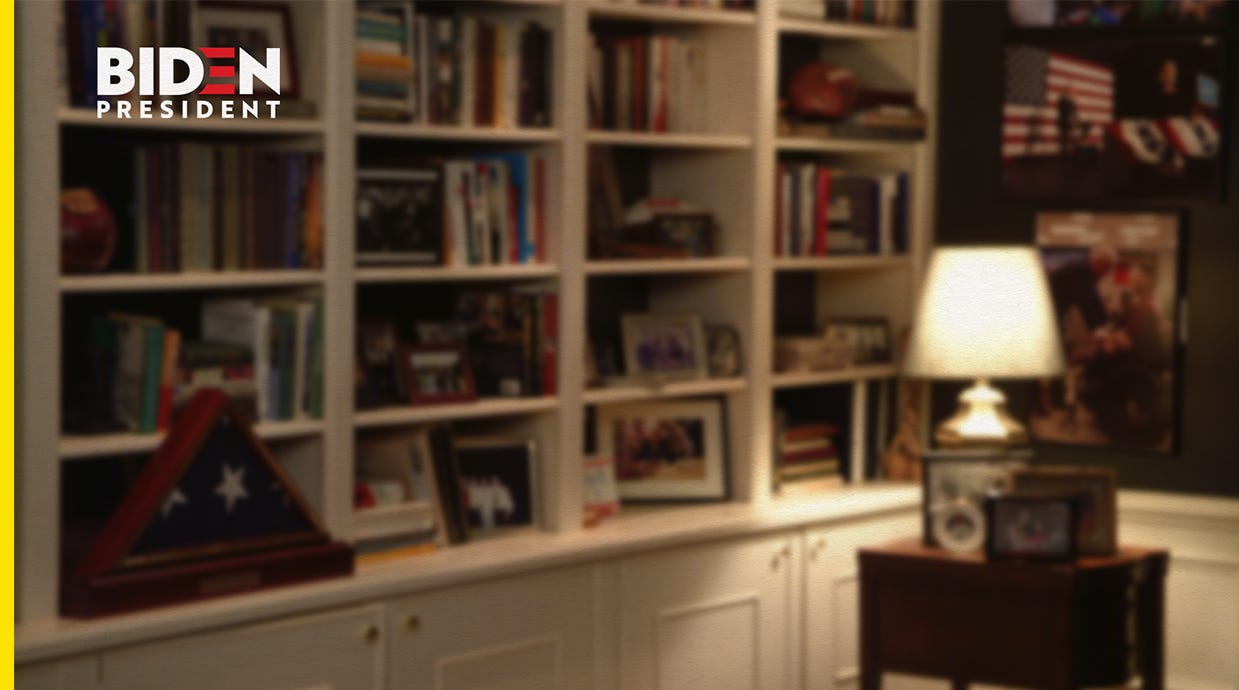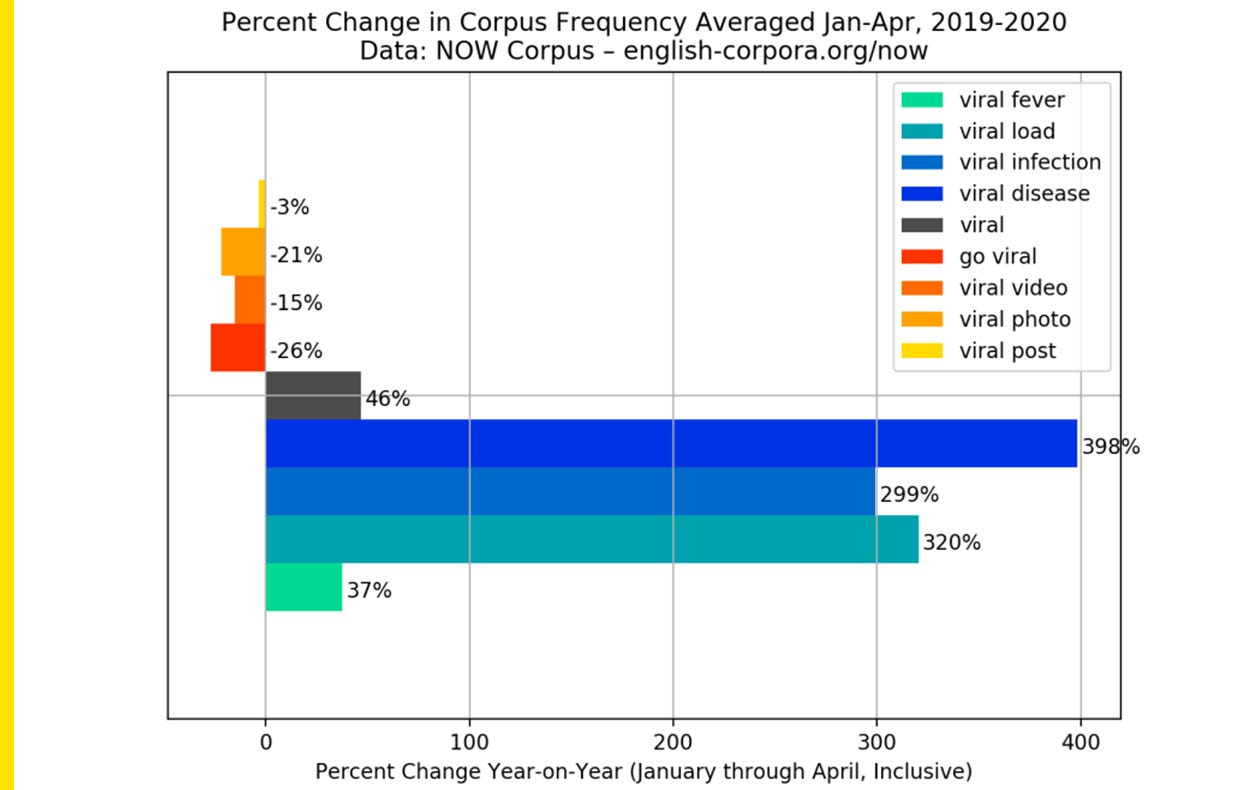Why Biden doesn’t need to “win the internet” to win the White House

Yes, former Vice President Biden is aware he’s not as big online as President Trump, but he’s OK with it. Also in this week’s issue:
How campaigns made their own lockdown merch
Don’t expect a White House portrait ceremony for Obama anytime soon
The way we use the word “viral” has changed
Yours,
P.S. I’m taking next Tuesday’s weekly newsletter off for Memorial Day. Miss you already.
Why Biden doesn’t need to “win the internet” to win the White House

In an interview with Snapchat’s Good Luck America, Biden said his campaign is “getting started late” online, and despite articles that he’s losing the internet, he’s polling better than Trump.
“I’m sure we can do better on the internet,” Biden said. “I’m positive of that. But if you notice, the more they write about the internet, the more my poll numbers go up, in terms of beating Trump. Nothing’s changed. We keep getting further and further ahead. So I’m not suggesting we can’t get better in the internet and social media platforms, but the fact is that we’re trying.”
Biden campaign digital director Rob Flaherty told Good Luck America’s Peter Hamby that they’re building a digital strategy specifically for Biden and that it won’t look like Trump’s on purpose.
“The job of a person who runs a digital team is not to be in the room saying, ‘Use every gadget and gizmo possible,’” Flaherty said. “The job of a digital person is to build the program that is a reflection of the person they work for. The best programs that exist are the ones that do that. Trump is scammy as hell. He’s controversial and just sort of brazen. His program looks like that.”
Hamby wrote that criticism that Biden “can’t internet” is “mostly malarkey” and Flaherty said that above all, their digital strategy should reflect empathy.
“For us, we’re trying to build a program that reflects the V.P.’s values, that is empathetic, that connects people in a moment when people are looking for connections,” Flaherty said. “Those are things that the data show are the things that people are craving. They are also the things that the V.P. uniquely has to offer. Not every clever idea is a good idea in that framework.”
If you’re looking for more insight and coverage into digital strategy and spending, I recommend the FWIW newsletter:
ACRONYM's weekly FWIW newsletter tracks digital strategy and spending in the 2020 presidential race. Every Friday, they dive into how political campaigns and advocacy groups are using the internet to reach voters and win elections. Subscribe here.
How campaigns made their own lockdown merch

The Biden campaign recently launched a “free swag” section on its online store with downloadable digital assets, including phone and desktop wallpaper and templates for stickers and buttons.
But what’s most interesting is how they’ve hopped on some of the lockdown’s hottest trends, with Biden-branded coloring pages, like the above page of the Biden’s German shepherds Champ and Major, and Zoom backgrounds, including backgrounds of Biden’s basement studio:

The Biden campaign’s “Joe’s Library” Zoom background
The Trump campaign was early with lockdown-themed merch. They sell a 200-piece Trump puzzle, wine glasses, and playing cards.

Earlier this month, Trump campaign manager Brad Parscale tweeted out a photo wearing a Trump-Pence face mask and said “more coming soon,” but masks have yet to appear on the campaign’s online shop.
Don’t expect a White House portrait ceremony for Obama any time soon

Then-President Obama with former President Bush and former first lady Laura Bush at their portrait unveiling in 2012. Credit: C-SPAN
The traditional White House portrait ceremony — in which a first-term president invites his predecessor and the former first lady back to unveil their portraits which will hang in the White House — could be getting a raincheck.
Trump will not be holding this ceremony for Obama, and Obama also isn’t interested in doing it while Trump is in office, people familiar with the matter told NBC News. Both the White House and Katie Hill, an Obama spokesperson, declined to comment to NBC.
American politicians tweet so much

Credit: Pew Research Center
A new Pew survey of Twitter activity by national-level legislators in the U.S. and four other predominately English-speaking countries between January 1 and June 30, 2019 found American lawmakers tweet a lot.
The median number of tweets per month for U.S. legislators was 79, compared with 70 in the United Kingdom, 48 in Canada, 33 in Australia, and 15 in New Zealand.

Credit: Pew Research Center
American lawmakers also used the highest percentage of emojis by far, with 🇺🇸 at the top of the list, used by 60% of legislators. The most-used hashtag by U.S. legislators was #sotu (for State of the Union), followed by #memorialday, #hr1 (for H.R. 1, or the For the People Act passed by the House last year), #mlkday, and #equalityact.
These are some of the best book covers of 2019

AIGA, the professional association for design, released its list of 50 winning book covers from 2019 on Monday.
Jurors Michael Bierut, Hilary Greenbaum, Lisa Lucas, and Silas Munro considered nearly 800 book and cover designs that were submitted and evaluated on criteria like concept, innovation, typography, and illustration, according to a news release. Above were a few of my favorites, but you can see the full list of winners from AIGA’s 50 Books | 50 Covers of 2019 competition here.
The way we use the word “viral” has changed

Credit: Ben Mericli/Merriam-Webster via MIT Technology Review
This one’s a bit of a no-brainer, but it’s still fascinating to see the numbers.
According to data of phrases that include the word “viral” used in news articles from the first four months of 2019 and 2020, phrases that referred to biological viruses, like “viral infection” and “viral load,” are way up this year compared to last, while phrases that refer to viral media, like “go viral” and “viral video,” are down. The data was compiled by a computational linguist at dictionary publisher Merriam-Webster and provided to MIT Technology Review.
It’s wild that one of the words that defined media and internet culture in the previous decade has reverted in usage so quickly. I wonder whether this change is permanent or not and if we’ll develop new vocabulary to describe how culture spreads online.
Mask for masc: How do you advertise public health for men during a pandemic?

ICYMI, I wrote about the role advertising can play in closing the gender gap when it comes to behavior related to Covid-19. You can read my story here.


